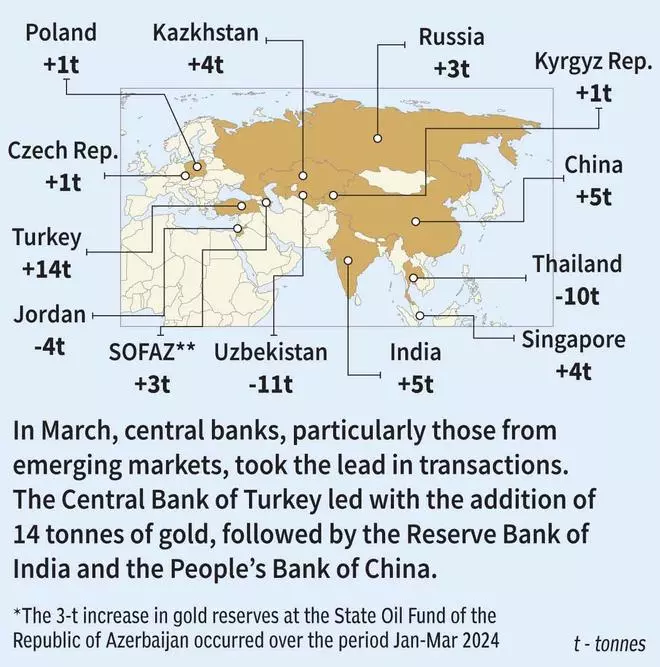Central Banks across the world continued their gold buying spree this year, adding 290 tonnes in the March quarter, even as record high prices hit consumer demand.

In fact, central banks accounted for 23 per cent of the overall gold demand at 1,238 tonnes in the March quarter.
Jewellery consumption in India was up 4 per cent, in the March quarter at 92 tonnes against 85 tonnes in the same period last year.
The central banks have accelerated their bet on the yellow metal and accounted consistently for almost a quarter of annual gold demand in the last two years.
In March quarter, 10 central banks added gold with India buying 19 tonnes while Central Bank of Turkey and People’s Bank of China purchased 30 tonnes and 29 tonnes.
RBI stepped up buying gold since 2008 and purchased 200 tonnes in 2009 during the global financial crisis.
This marks the 17th consecutive monthly increase, helping central banks lift their reported gold holdings to 2,262 tonnes, about 16 per cent higher than as of October, 2022, when they resumed reporting monthly additions, said the World Gold Council.
Apart from dollar weakness against major currencies, the huge gold buying by the central banks have been driving the yellow metal prices.
Gold prices have increased 10 per cent to $2,070 ($1,860) an ounce, in the March quarter, while, it was up 8 per cent to $1,940 ($1,800) in 2023.
Rattled by the geo-political developments and disturbed by a slowing global economy, the central banks have been hedging their risk by increasing the gold component of their forex reserves, despite prices hitting a record high.
Interestingly, the central banks of Turkey, China and India, have been leading from the front in adding gold to their forex reserves.
Madan Sabnavis, chief economist, Bank Of Baroda said RBI is strategically increasing gold reserves as part of its forex diversification efforts and a major portion of RBI reserves are in dollar apart from other currencies.
Gold is the best hedge against the dollar as it goes up when the dollar depreciates, he added.
With the recent surge in dollar volatility and the upward trajectory of gold prices, the move not only enhances the stability of foreign exchange reservesbut also makes it a prudent financial decision, said Sabnavis.
- Also read:Who’s been fuelling the new gold rush?
Sachin Jain, Regional CEO India, World Gold Council said the central banks’ gold purchases are not influenced by rising prices, though, some of them may take a pause depending on their strategy.
While many central banks’ ongoing voracious appetite for gold has been one of the key drivers of its recent performance in the face of seemingly challenging conditions including higher yields and US dollar strength, he added.
